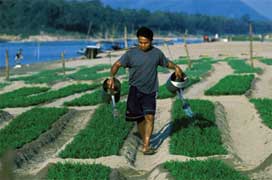RCA News


RCA News
View
| IFAD Evaluations of Organic Agriculture among Small Farmers To Identify Organic Methods as a Part of Development Programme IFAD Case Studies Conducted in China, India and other Countries | |||
|---|---|---|---|
|
Name
admin |
Date
2005.03.16 |
Views
3849 |
|

Globalization and its efforts on food markets pose new challenges to farmers, governments and international organizations aiming to reduce rural poverty. Agricultural producers are subjected to high standards and to the volatility of prices in international markets. At the same time, however, globalization may open new opportunities for small producers.
With increasing retail sales and high medium-term growth rates, organic food production could represent a promising alternative, especially for small farmers in developing countries, since organic agriculture is labour-intensive in terms of production and supervision and, if applied correctly, does not have a negative impact on producers or the environment.
To tap into these new markets, small producers must overcome a number of hurdles, such as lack of technical know-how, limited storage and processing facilities, inadequate market information, complex certification processes and insufficient financing. In this context, IFAD's Office of Evaluation has conducted two evaluations of organic agriculture among small farmers across Asia and Latin America. The evaluations focused on a varied series of case studies and several key areas: 1) The characteristics of organic production and marketing 2) The impact of organic production on small farmers and their communities 3) The specific constraints and
opportunities faced by organic producers, and 4) The role of institutions and the public sector.
The evaluations explored the pros and cons of adopting organic methods in terms of poverty reduction, food security and trade. From this work, a set of conclusions was drawn synthesizing the most important lessons and key success factors that help identify, motivate and design projects in which organic methods could be a useful component.
For further information, visit www.ifad.org/events/organic
Attachments




